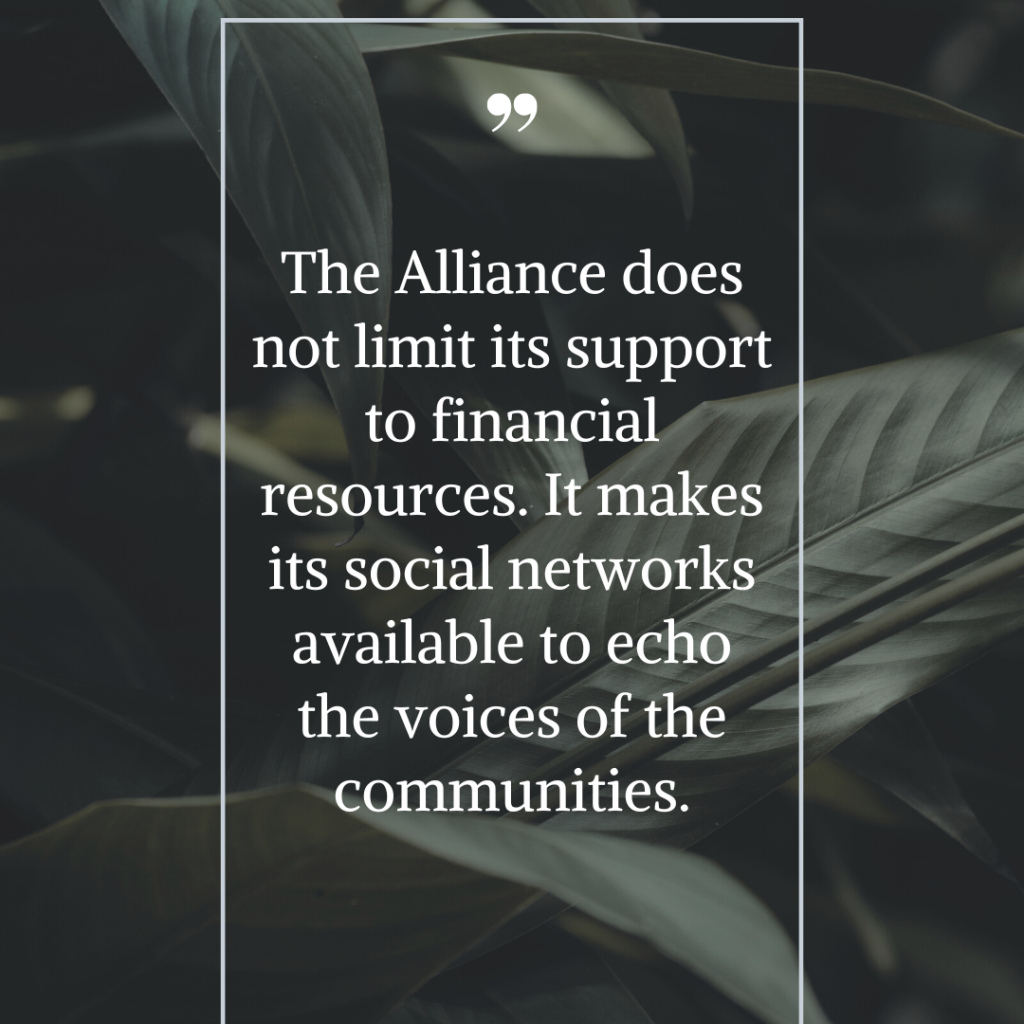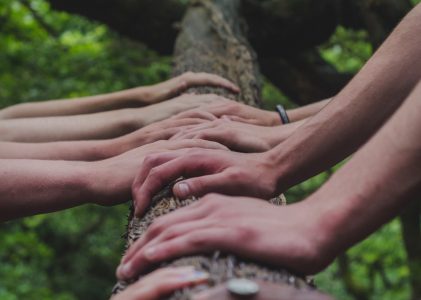By Allyne Andrade e Silva, Angélica Basthi, Cristina Orpheo and Fernanda Lopes

Although collaboration is an old practice among philanthropic organizations, the idea of “collaborative philanthropy” in Brazil is relatively new and is a concept still under construction. Here in Brazil, collaboration is creating new relationships in the field of philanthropy for social justice. It all started in 2021, when three fund in Brazil, the Baobá Fund for Racial Equality, the Brazil Human Rights Fund, and the Casa Socio-environmental Fund came together to create the Alliance of Funds. During the COVID-19 crisis, members of the Brazil Network of Philanthropy for Social Justice – now the Comuá Network – had to turn to each other for solidarity. It was then that the three Funds joined together in alliance. Since then, this alliance has marked the emergence of a new identity linked to a commitment to collaborate on philanthropy for social justice in Brazil.
Out of the pandemic, a solidarity emerged that mobilized civil society to support people, especially in the large urban centres of the country where the most severe effects of the pandemic were being experienced. Isolated in locations difficult to access, indigenous peoples and Quilombola communities remained alone in the worst moments of the health crisis. “Quilombo” is the denomination for communities of black slaves who resisted the slavery regime that prevailed in Brazil for over 300 years and was abolished in 1888. It was only in 1988, a century after the abolition of slavery, that the Brazilian Constitution recognized the existence and rights of contemporary Quilombos for the first time. The 1988 Constitution guaranteed Quilombo communities the right to own their collective territories – but enforcing Quilombola’s rights to their land is still a huge challenge to this day.
The Baobá Fund for Racial Equality, the Brazil Human Rights Fund, and the Casa Socio-environmental Fund were the first to individually launch emergency calls for proposals to support these groups in 2020. It was in this context that a focus on the most invisible populations by the Alliance of Funds has emerged. The initiative is the materialization of conversations initiated by the Comuá Network. It calls for bold and necessary action in the face of a conservative and complex political scenario, and further aggravated by the rise of the extreme right and by the COVID-19 pandemic.
In all of this, the Baobá Fund for Racial Equity, the Brazil Human Rights Fund, and the Casa Socio-environmental Fund are connected by a shared commitment to social justice and to strengthening this agenda in the field of philanthropy in Brazil. These funds believe that national and international private investments should increasingly contribute to the promotion of social justice with an emphasis on addressing structural issues such as gender and race inequality, the underrepresentation of groups facing environmental crises in Brazil, and other socio-environmental hierarchies.
During the COVID-19 crisis, members of the Brazil Network of Philanthropy for Social Justice – now the Comuá Network – had to turn to each other for solidarity.
After various and long conversations – based on listening done in the territories – the funds elected three crucial themes to guide the actions of the Alliance. These are the defense of rights, community resilience and economic sustainability of families, and food sovereignty of the most vulnerable populations facing the COVID-19 pandemic. These themes were carefully chosen as strategic for the guarantee and expansion of dignity and the promotion of equality, emphasizing the most vulnerable groups of the Brazilian social pyramid.
Joint governance, but with uniqueness respected
The Alliance of Funds is the result of sharing what each fund implemented through their emergency calls. These exchanges between the funds continue to forge something deeper in the field of philanthropy for social justice. Although governance is collective and the distribution of resources is joint, each fund preserves its uniqueness in the relationships established in the territories where they work. When the three funds made joint efforts to raise funds, the result was an initial contribution of $400,000, distributed through various calls for proposals for Quilombolas and indigenous people.
In addition, the funds had been experimenting with governance. They practiced the harmonization of diagnostic issues, while valuing the unique relationship of each fund with its grantees, carried out monitoring, evaluation, and gathering lessons learned in a collective way.
This collaborative-innovation generated surprising results across the indigenous and Quilombola territories compared to the operational models previously practiced by philanthropic institutions in Brazil. In general, the actions of philanthropic institutions are disjointed, lack aligned coordination, and tend to act without a broader and collective vision for advancing common goals. Actions by the Alliance of Funds seek to overcome these weaknesses. Each fund acts in a specific territory, therefore eliminating the overlapping of institutions in a common territory. Exchanges and learning are shared, which optimizes resources and enhanced results. Each fund had access to lessons learned even in territories where they did not work.
Although governance is collective and the distribution of resources is joint, each fund preserves its uniqueness in the relationships established in the territories where they work.
These collaborations also improve the relationship with the grantees, because acting in this transformational way proposed by the Alliance of Funds directly favours the territories. The grantees experiences new arrangements committed to promoting community protagonism and inject resources in the territories that need support the most. Solutions are created based on the experiences of each reality and, therefore, it is the communities that assume the power of decision-making and the direction of local actions.
In this context, the collaborative philanthropy of the Alliance of Funds demonstrated that access to financial resources is necessary, but it is not enough. The local protagonism and the power of decision-making to overcome rights violations belongs to the people who act with a community response. In this way, the Alliance of Funds supports people on the frontlines of confronting the structural issues of inequality, and promoting access to rights and citizenship.
One of the projects here included a collective of indigenous people working together to recover 305 hectares of degraded area. Their long-term strategy is the maintenance and expansion of key indigenous tree species such as mahogany, copaiba, cedar, jatobá and cumaru de cheiro. This work recognizes that climate phenomena and other natural imbalances caused by human action impact already affect vulnerable groups such as indigenous and Quilombolas in varied ways. These are people on the frontlines of confronting violations of their rights and who take care of the land, the forests and other natural resources.

Social transformation as a challenge
During this time, mutual trust and transparency forged the basis of the relationships built within the Alliance of Funds. Deepening the bonds of trust and legitimizing transparency with Quilombola and indigenous communities has been the most effective way to practice philanthropy oriented towards social transformation. The practice inaugurated a joint governance model that is 100% committed to this transformation. It became the basis of a collaborative practice that respects uniqueness, enhances collective actions, aligns strategies in pursuit of social transformation, and, moreover, strengthens the institutional capabilities of each fund.
Furthermore, the Alliance provided a historic opportunity for the funds that make it up: to offer exclusive grants for Quilombolas and indigenous people. Three independent calls for proposals launched under the Alliance drew the attention of 358 community organizations throughout the country (North, Northeast, South, Southeast, and Center-West) that registered their projects. From this total, 78 were selected and received resources from the beginning of 2022 through the three Funds. The largest concentration of projects approved under the Alliance is in the Northeast region, which, despite showing a significant concentration of poverty and lower HDI (Human Development Index), has a vibrant and powerful civil society.
The Alliance does not limit its support to financial resources. It makes its social networks available to echo the voices of the communities to generate public conversations about defending the territory, confronting agri-business, expanding agro-ecological practices, food security and sovereignty, empowering women, training young leaders, and confronting the devastation of the Amazon, amongst other issues. Since then, these social networks have been deployed weekly by the funds on their social networks.
In October 2022, the Alliance of Funds organized a training session on communication involving all the supported projects, led by the Communication Collective Mídia Índia and the Communication Collective of CONAQ (National Coordination of Articulation of Quilombos). The activity fostered the exchange of experiences, offered tips on tools, and presented knowledge about the various modes of communication to be applied in Quilombola and indigenous territories, strengthening local powers. Besides promoting learning, the action motivated the formation of new support networks, broadened perspectives, and approaches, and strengthened the construction of other narratives produced by the projects themselves.
In this way, the Alliance of Funds is weaving new arrangements that act in an innovative and efficient way in the processes for social transformation in favour of social justice. One of the goals of the three funds within the Alliance is to call on the field of philanthropy itself to act in the construction of new arrangements committed to the real confrontation of the structural issues that impede the full development of Brazilian society – with emphasis on social, racial, and environmental inequalities.
Collective action and stimulating interventions that, in fact, focus on responding to the causes of structural inequalities has always been a challenge in Brazil, but the Alliance of Funds is a real and concrete initiative that proposes another way of collaborative philanthropy under construction for the country.
Fernanda Lopes is the Program Director of Baobá Fund for Racial Equity. Biologist, doctor in public health, anti-racist activist.
Allyne Andrade e Silva is the Deputy Superintendent of the Brazil Human Rights Fund. She holds a master’s and doctorate in law from USP.
Cristina Orpheo is the Executive Director of the Casa Socioambiental Fund. She has a post-graduate degree in social project management, third sector, and environmental management.
Angélica Basthi is the Consultant for the Alliance among Funds. Journalist and Master in Communication and Culture from UFRJ.
A version of this article was originally published in Portuguese by Comuá Network.

